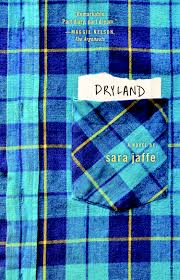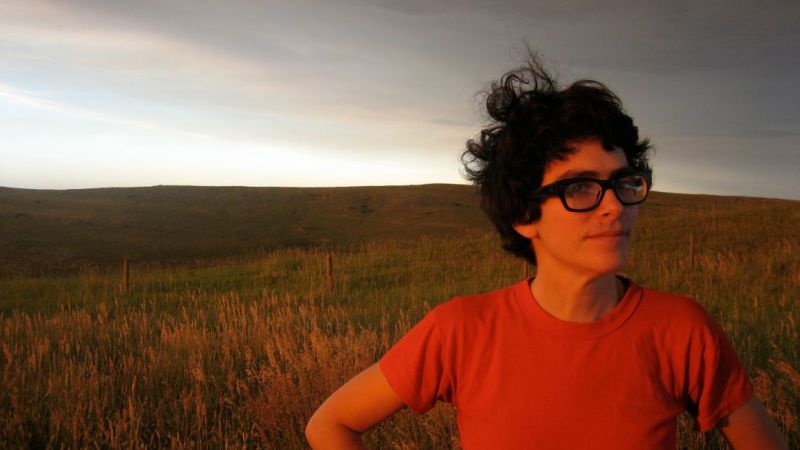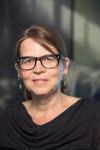Editor’s Note: The Spine is a new book column covering the literary scene of the Bay Area in reviews, interviews, guides, event previews and more. Guiding us is award-winning writer Leilani Clark, who’s contributed to Mother Jones, Civil Eats, Time Magazine, the Rumpus and the North Bay Bohemian, in addition to KQED. Running biweekly, The Spine is your smart check-in on what’s happening in the region’s book world.
Review: Dryland by Sara Jaffe
Sophomore year is a strange time in the life. You aren’t a newbie to high school. And most kids, if they’re lucky, have made it through the tumultuous transitions wrought by puberty, with a new body and altered, hormonal brain in tow. Still, you are nowhere near — at least this is how it feels when you’re deep in the muck — to finishing high school and entering the adult world. Dryland, the debut novel from Sara Jaffe, a fiction writer and musician who lives in Portland, fully captures that adolescent irritation, and the strange sensation of floating above your own teenage life. The novel is a seamless, dreamy, gray ride through a few months in the life of Julie Winter, a high school sophomore who lives in the Pacific Northwest (probably Portland, though that’s never explicitly stated) who is on a semi-sleepwalking journey between childhood and young adulthood.
Julie lives in a suburban, unchallenged home environment with her mother and fa ther. Her brother, a former high school swimming champion with Olympic aspirations and a secret, has disappeared. Maybe to San Diego. Maybe to Berlin. His once-a-year phone calls reveal nothing much about his current life. It’s the early 1990s, and Julie spends Saturdays at the River Market, scoping Guatemalan bags and contemplating clove cigarettes with her best and oldest friend Ericka. To Julie, Ericka has become almost alien in her lust for skater boys and dreams of ascending out of the yearbook captioning ghetto and into greater high school fame. When Julie embarks on a reluctant friendship with Ben, an old friend of her brother’s, she uncovers an entry point into another way of living, not to mention the rock band My Bloody Valentine’s 1991 album Loveless.
ther. Her brother, a former high school swimming champion with Olympic aspirations and a secret, has disappeared. Maybe to San Diego. Maybe to Berlin. His once-a-year phone calls reveal nothing much about his current life. It’s the early 1990s, and Julie spends Saturdays at the River Market, scoping Guatemalan bags and contemplating clove cigarettes with her best and oldest friend Ericka. To Julie, Ericka has become almost alien in her lust for skater boys and dreams of ascending out of the yearbook captioning ghetto and into greater high school fame. When Julie embarks on a reluctant friendship with Ben, an old friend of her brother’s, she uncovers an entry point into another way of living, not to mention the rock band My Bloody Valentine’s 1991 album Loveless.
Ultimately, Dryland is more a novel of feeling than plot. While grounded in quotidian life in a way reminiscent of Haruki Murakami’s style — think lots of coffee drinking and descriptions of chicken dinners — the book somehow floats above everything. It gives the sensation of being of the earth, water, and sky all at once.
When Julie decides to become a swimmer herself to mixed success, the book’s prose really hits the sweet spot. My favorite moment arrives when Julie dives into the pool at her first swimming practice.
“My body sailed. It flew. To call what was happening swimming would be to render mechanical what felt, in the feeling – the being – of it, like sugar, like a dream. The floor of the pool was toothpaste blue and my shadow was that cool, fast color. My body sailed. My first head-lift to take a breath, already halfway down the lane. Breathe and duck and back under, smooth, there could have been nobody else in the pool. The pool could have been surrounded by everyone – Alexis, Coach – watching me shuttle, sail, unaware with their watching. Something brushed the bottom of my foot and I shoot it off and thought of seaweed, as if I were not only weightless but poolless, as if what I’d felt was the touch of the chorusing flotsam that surrounded and supported me.”
Later, when Julie realizes, sort of, that she has a crush on the girls’ swim team captain Alexis, Jaffe treats a potential “coming out” story with a light, deft hand, never explicitly stating that Julie has suddenly realized she is gay. It’s all in the moment, just as it is in real life: little moments adding up to a life lived. There aren’t any grand realizations or declarations of love. That writerly choice by Jaffe ends up being as satisfying as any dramatic arc of events.



